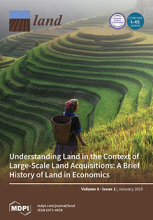/ library resources
Showing items 1 through 7 of 7.In economics, land has been traditionally assumed to be a fixed production factor, both in terms of quantity supplied and mobility, as opposed to capital and labor, which are usually considered to be mobile factors, at least to some extent.
Most literature on land tenure in sub-Saharan Africa has presented women as a homogenous group. This study uses evidence from Ghana, Nigeria, and Zimbabwe to show that women have differentiated problems, needs, and statuses in their quest for land access and tenure security.
The expansion of oil palm plantations in Papua province, Indonesia, involves the conversion of forests, among other land types in the landscapes, which are a source of clan members’ livelihoods.
We examine collaborations between the state and civil society in the context of land grabbing in Argentina. Land grabbing provokes many governance challenges, which generate new social arrangements.
Ethiopia has implemented one of the world’s most cost-effective systems to document land holdings, the land certification system. After more than 15 years since its launch, questions have been raised regarding its functionality.
Our purpose is to present and test a typology of land reform theories as a means of understanding and interrogating the motives behind land reform and to better equip land administrators and policymakers to enact land reform programs that are appropriate for their contexts.
The use of land consolidation on customary lands has been limited, though land fragmentation persists. Land fragmentation on customary lands has two main causes—the nature of the customary land tenure system, and the somewhat linked agricultural system.
Land Library Search
Through our robust search engine, you can search for any item of the over 73,000 highly curated resources in the Land Library.
If you would like to find an overview of what is possible, feel free to peruse the Search Guide.






